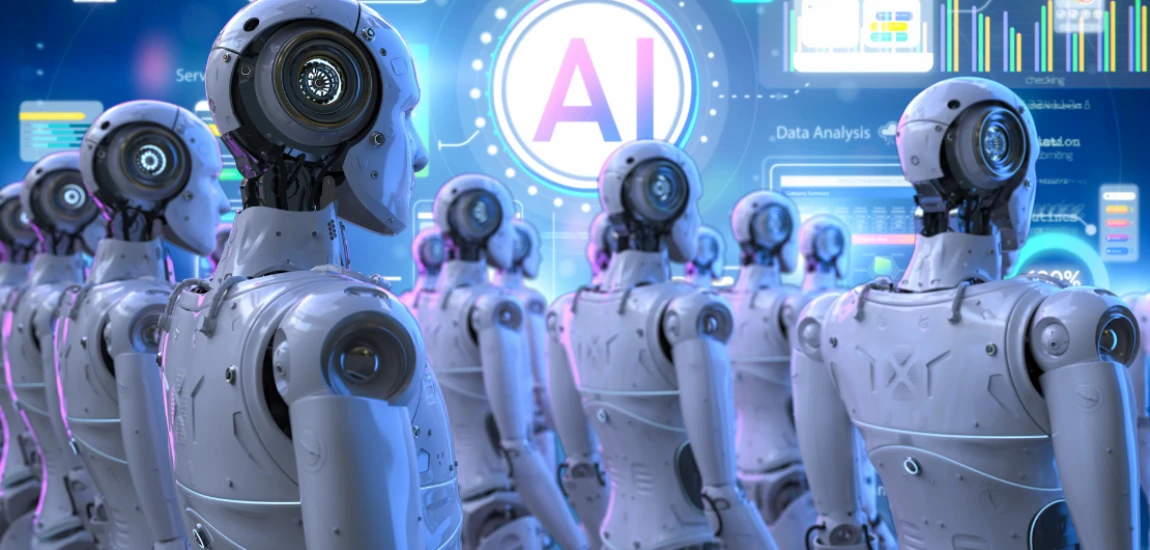Entertainment in the Age of AI: Where Do Humans Fit In?

Artificial Intelligence is no longer a futuristic idea—it’s here, and it’s reshaping every industry, especially entertainment. From AI-generated screenplays and digital actors to personalized playlists and virtual influencers, AI has become a powerful creative force. But as technology takes center stage, one pressing question emerges: where do humans fit in?
For centuries, entertainment has been a reflection of human creativity—our stories, emotions, and experiences. Yet, AI now generates music tracks in minutes, creates photo-realistic characters, and recommends content tailored to our tastes better than we sometimes know ourselves. This raises both excitement and anxiety: Will AI replace human creativity, or will it serve as a tool to elevate it?
In this blog, we’ll dive into the impact of AI on the entertainment industry, exploring its influence on film, music, gaming, and audience engagement. We’ll also consider ethical challenges, the value of human originality, and the evolving partnership between humans and machines. Ultimately, we’ll try to answer the critical question: in the age of AI, how can human creativity continue to thrive?
The Rise of AI in Entertainment

How AI Entered the Scene
AI’s integration into entertainment began subtly. Recommendation algorithms like Netflix’s “Because You Watched” feature and Spotify’s Discover Weekly playlists were early examples of AI enhancing user experiences. Over time, the technology expanded into content creation, with AI generating scripts, music, and even entire video games.
AI’s Versatility Across Platforms
Today, AI is present in nearly every corner of entertainment. Streaming platforms use it to keep viewers engaged, film studios experiment with AI for special effects, and video game developers rely on machine learning to design adaptive gameplay. Even social media content is increasingly influenced by AI-driven tools, from filters to automated editing apps.
Why It Matters
This rise signals a shift from AI being a background tool to a front-stage collaborator. The entertainment industry is no longer just powered by human creativity—it’s now co-piloted by machines.
AI in Film and Television

Automated Storytelling
AI can generate plot outlines, dialogue, and even full scripts. Programs like ScriptBook analyze story structures to predict box-office success, while others create original screenplays. While not all AI-generated scripts are groundbreaking, they showcase how automation can streamline creative processes.
Digital Actors and Visual Effects
Virtual humans are now appearing in advertisements and films, created entirely by AI. Deepfake technology and CGI powered by machine learning allow for lifelike performances that blur the line between reality and fiction. Studios are also using AI to de-age actors or resurrect late performers on screen.
Human Touch Still Matters
Despite these advancements, audiences often crave authentic human emotion. AI may handle technical aspects, but nuanced storytelling and empathy still remain uniquely human. The most successful AI-assisted films combine innovation with human oversight, ensuring stories resonate emotionally.
AI’s Impact on Music

AI-Generated Songs
Music composition has seen a massive AI disruption. Platforms like AIVA and Amper Music allow creators to generate custom tracks in seconds, catering to everything from film scores to TikTok videos. This makes music more accessible but raises questions about originality.
Personalized Listening Experiences
Streaming services rely heavily on AI for curated playlists. Algorithms analyze listening patterns, mood, and cultural trends to deliver highly personalized recommendations, keeping listeners engaged for longer.
Musicians vs. Machines
While AI can generate melodies and beats, music remains deeply tied to human emotion and storytelling. The rise of AI-generated songs challenges traditional artists but also opens new opportunities for collaborations between humans and machines, pushing creative boundaries.
Gaming in the AI Era

Smarter Non-Playable Characters (NPCs)
AI has transformed gaming by making NPCs more responsive and adaptive. Instead of predictable patterns, NPCs now “learn” and react dynamically, creating more immersive gameplay experiences.
Procedural World-Building
Games like No Man’s Sky use AI to generate massive universes, offering nearly infinite possibilities. Procedural generation allows developers to build expansive worlds without handcrafting every detail, making games richer and more replayable.
The Player Experience
AI doesn’t just build games; it personalizes them. Adaptive difficulty levels and personalized storylines ensure players feel both challenged and connected. This blend of human storytelling and AI-powered responsiveness is shaping the future of interactive entertainment.
The Audience Experience: Personalization and Beyond

Content Curation
AI powers the way audiences discover content. From YouTube’s recommended videos to TikTok’s For You Page, algorithms dictate what millions watch daily. This level of personalization ensures engagement but also raises concerns about echo chambers and overreliance on AI.
Interactive Entertainment
Audiences now expect more than passive viewing. AI-driven innovations like Netflix’s interactive film Bandersnatch give viewers agency in shaping story outcomes. This interactive trend is reshaping how audiences engage with entertainment.
The Double-Edged Sword
While personalization enhances user experience, it can also reduce serendipity. Without human curation, audiences risk being confined to algorithmically curated bubbles, missing out on diverse storytelling.
Ethical Challenges of AI in Entertainment

Copyright and Ownership
If an AI generates a screenplay or composes a song, who owns the rights—the programmer, the platform, or the AI itself? Current laws lag behind technological advancements, creating legal gray areas.
Authenticity and Manipulation
Deepfakes and AI-generated performances raise concerns about authenticity. When audiences can no longer distinguish real from synthetic, trust in entertainment could erode.
Job Displacement
AI’s growing role sparks fears about human creators being replaced. Writers, musicians, and visual artists face increasing pressure to prove the value of uniquely human creativity in a machine-driven industry.
The Human Role in the Age of AI

Creativity as a Human Superpower
Despite AI’s rapid advancements, it lacks human imagination, empathy, and lived experience. Storytelling grounded in human emotion continues to resonate most deeply with audiences.
Collaboration, Not Replacement
The future isn’t about humans versus AI—it’s about collaboration. Creators who embrace AI as a tool rather than a competitor can unlock new levels of innovation. Musicians can experiment with AI beats, filmmakers can streamline production, and game developers can expand their worlds.
Reclaiming Human Connection
As AI saturates entertainment, authenticity becomes even more valuable. Audiences will gravitate toward stories, performances, and art that feel genuinely human, reinforcing the importance of human voices in a digital age.




